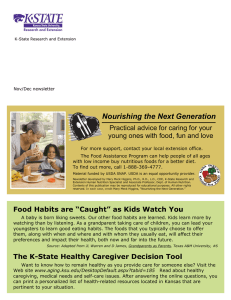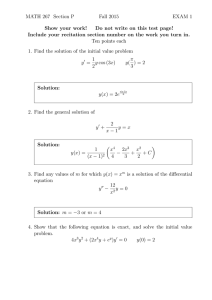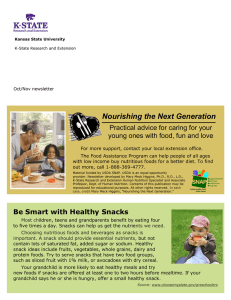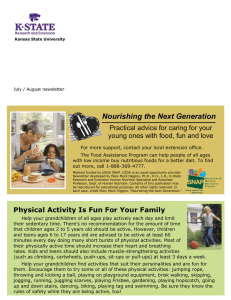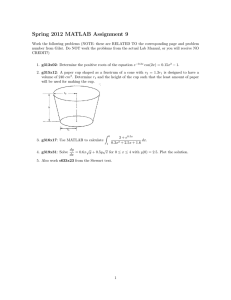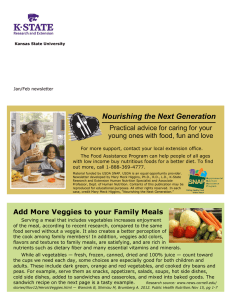Nourishing the Next Generation Practical advice for caring for your
advertisement
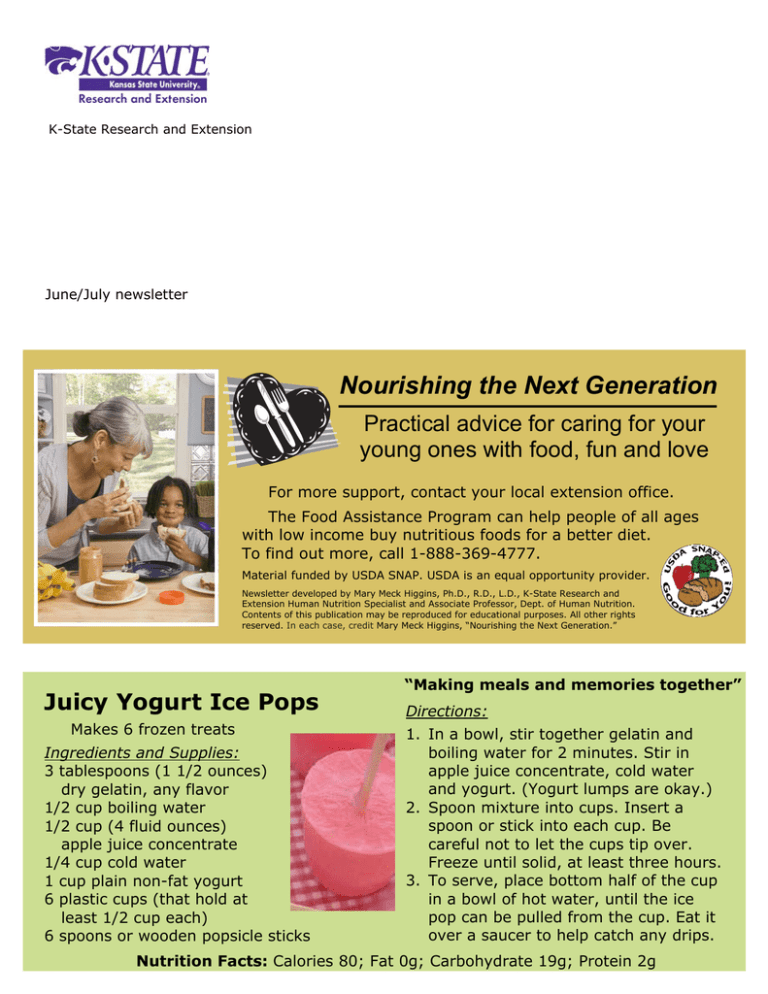
K-State Research and Extension June/July newsletter Nourishing the Next Generation Practical advice for caring for your young ones with food, fun and love For more support, contact your local extension office. The Food Assistance Program can help people of all ages with low income buy nutritious foods for a better diet. To find out more, call 1-888-369-4777. Material funded by USDA SNAP. USDA is an equal opportunity provider. Newsletter developed by Mary Meck Higgins, Ph.D., R.D., L.D., K-State Research and Extension Human Nutrition Specialist and Associate Professor, Dept. of Human Nutrition. Contents of this publication may be reproduced for educational purposes. All other rights reserved. In each case, credit Mary Meck Higgins, “Nourishing the Next Generation.” Juicy Yogurt Ice Pops Makes 6 frozen treats Ingredients and Supplies: 3 tablespoons (1 1/2 ounces) dry gelatin, any flavor 1/2 cup boiling water 1/2 cup (4 fluid ounces) apple juice concentrate 1/4 cup cold water 1 cup plain non-fat yogurt 6 plastic cups (that hold at least 1/2 cup each) 6 spoons or wooden popsicle sticks “Making meals and memories together” Directions: 1. In a bowl, stir together gelatin and boiling water for 2 minutes. Stir in apple juice concentrate, cold water and yogurt. (Yogurt lumps are okay.) 2. Spoon mixture into cups. Insert a spoon or stick into each cup. Be careful not to let the cups tip over. Freeze until solid, at least three hours. 3. To serve, place bottom half of the cup in a bowl of hot water, until the ice pop can be pulled from the cup. Eat it over a saucer to help catch any drips. Nutrition Facts: Calories 80; Fat 0g; Carbohydrate 19g; Protein 2g Nourishing the Next Generation Practical advice for caring for your young ones with food, fun and love Plan for Active Family Fun, Good Foods This Summer School is out! Over the next few months, make time for your family to have fun, be physically active and eat right together. Grandparents can teach their youngsters the games that they used to play as kids. Kids can teach their grandparents some current games. Be creative and make up new active games together. Have fun while getting the family moving. The guidelines for children and teens are to be physically active for at least 60 minutes on most days, while adults should be active for at least 30 minutes on most days. Make meals and memories together often this summer. (For instance, cool off with the juicy yogurt ice pops recipe on the back of this newsletter.) Eat together as a family as often as possible. At meals, fill half of your plates with fruits and vegetables. Serve more whole grains and low-fat dairy products. For between-meal snacks, serve unsweetened beverages and fruits or vegetables most of the time. Cut fruits and vegetables into bitesize pieces for young children. And have the grandkids sit down while eating, so they’ll be less likely to choke. Source: Adapted from T Kidd, Young Families, Kansas State University, Vol. 10, #3 Sports Nutrition Improves Athletic Performance Is one or more of your grandchildren an athlete? Good nutrition (especially enough fluids, calories, carbohydrate, protein and fat) before, during and after exercise can help them maintain energy, maximize performance, improve exercise recovery time, maintain a healthy body weight, replenish glycogen stores, and build and repair muscle tissue. Before exercise, be well-hydrated, and eat familiar high-carb foods moderate in protein but low in fat and fiber. During exercise, drink enough fluid to balance sweat losses, and eat 30 to 60 g carbohydrate per hour. After exercise, drink 2 to 3 cups of fluid for every pound of weight lost during exercise. Eat 5 to 7 g carbohydrate for every 100 pounds body weight in the first 30 minutes, and again every 2 hours for 4 to 6 hours after the event. Drinking chocolate milk or sports beverages before, during and after long bouts of exercise helps maintain blood sugar levels, provides fuel for muscles, and decreases the risk of dehydration or low salt levels that may occur with profuse sweating. Athletes should not use severe weight loss practices or eliminate entire food groups from their diets. Supplements are not needed if an athlete eats a variety of foods. Nutritional ergogenic aids should be used with caution, if at all. Source: Adapted from Medicine & Science in Sports & Exercise, 2009;41:709-731 Kansas State University Agricultural Experiment Station and Cooperative Extension Service, Manhattan, KS. K-State Research and Extension is an equal opportunity provider and employer. Kansas State University, County Extension Councils, Extension Districts and the U.S. Department of Agriculture Cooperating.
